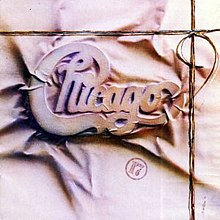| Chicago 17 | ||||
|---|---|---|---|---|
 | ||||
| Studio album by | ||||
| Released | May 14, 1984[1] | |||
| Recorded | Mid 1983 – early 1984 | |||
| Studio | The Lighthouse (North Hollywood, California) Sunset Sound (Hollywood) The Record Plant (Los Angeles) | |||
| Genre | ||||
| Length | 41:53 | |||
| Label | Full Moon/Warner Bros.[2] | |||
| Producer | David Foster[2] | |||
| Chicago chronology | ||||
| ||||
| Singles from Chicago 17 | ||||
| ||||
| Review scores | |
|---|---|
| Source | Rating |
| AllMusic | |
Chicago 17 is the fourteenth studio album by American rock band Chicago, released on May 14, 1984. It was the group's second release for Full Moon/Warner Bros. Records, their second album to be produced by David Foster[7] and their last with founding bassist/vocalist Peter Cetera. As of 2023, it remains Chicago's best-selling album, with over 6.1 million copies being sold in the United States, the United Kingdom, and Japan.[8] Four singles were released from the album, all of which peaked in the top 20 on the Billboard Hot 100 chart.[9] The success of the music videos for "Stay the Night", "You're the Inspiration", and "Hard Habit to Break" on MTV propelled Chicago 17 to achieve an RIAA certification of six times platinum.[10]
In 1985, the album received three Grammy Awards. David Foster won for Producer of the Year, Non-Classical (tied in this category with Lionel Richie and James Anthony Carmichael),[11][12] Humberto Gatica won for Best Engineered Recording – Non-Classical,[13] and David Foster and Jeremy Lubbock won for Best Instrumental Arrangement Accompanying Vocal(s)[13] for "Hard Habit to Break" which was also nominated for Record of the Year, Best Pop Performance by a Duo or Group With Vocals and Best Vocal Arrangement for Two or More Voices.[14] In his review of the album for AllMusic, music critic Stephen Thomas Erlewine says Chicago 17 is "the pinnacle of [producer David Foster's] craft and one of the best adult contemporary records of the '80s," and one of the most influential albums "within its style."[15] Writing for Billboard, Bobby Olivier said the album "is one of the greatest pure power ballad albums of all time — or at least from 1984 — and "[Hard] Habit [to Break]" is one of the finest entries."[16]
In 2006, Rhino Entertainment remastered and reissued the album, using the original analog versions of "Please Hold On" (which was co-written with Lionel Richie who was enjoying success from his album Can't Slow Down) and "Prima Donna" and adding a Robert Lamm demo, "Here Is Where We Begin" as a bonus track.
- ^ a b The Very Best of Chicago: Only the Beginning (CD liner). Chicago. Rhino. 2002. p. 11. R2 76170.
{{cite AV media notes}}: CS1 maint: others in cite AV media (notes) (link) - ^ a b Chicago (1984). Chicago 17 (vinyl LP record). U.S.A.: Warner Bros. Records, Inc. 25060-1.
- ^ "Chicago singles".
- ^ "Chicago singles".
- ^ "FMQB" (PDF). p. 26.
- ^ https://www.allmusic.com/album/r3860
- ^ Deriso, Nick (May 14, 2015). "Danny Seraphine and Bill Champlin defend 'Chicago 17'". Something Else!. Retrieved July 27, 2017.
- ^ "CHICAGO 17 by CHICAGO sales and awards". BestSellingAlbums.org. Retrieved 2023-09-24.
- ^ "Chicago – Awards: AllMusic". AllMusic. All Media Network. Retrieved January 17, 2013.
- ^ "Gold & Platinum - RIAA". RIAA. Retrieved 2017-01-20.
- ^ Graff, Gary (January 11, 1985). "The Grammy Awards: Prince, Tina Turner, Cyndi Lauper take five nominations each". Detroit Free Press. pp. 1C, 5C. Retrieved July 26, 2017 – via Newspapers.com.

- ^ "Grammy Winners". Los Angeles Times. February 27, 1985. p. 5V. Retrieved July 26, 2017 – via Newspapers.com.

- ^ a b "27th Annual GRAMMY Awards". GRAMMY.com. January 16, 2013. Retrieved July 26, 2017.
- ^ "Chicago". GRAMMY.com. May 14, 2017. Retrieved July 26, 2017.
- ^ Erlewine, Stephen Thomas. "Chicago 17: AllMusic Review by Stephen Thomas Erlewine". AllMusic. Retrieved February 26, 2019.
- ^ Olivier, Bobby (April 25, 2019). "The 50 Best Chicago Songs: Critics' Picks". Billboard.